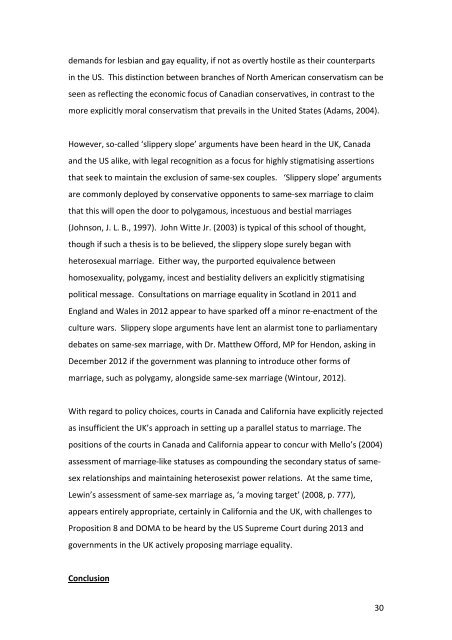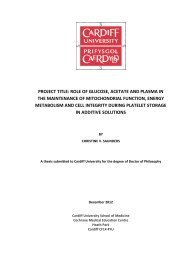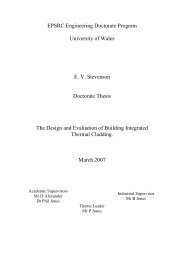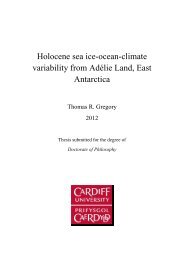- Page 1: Same-Sex Marriage, Civil Partnershi
- Page 5 and 6: Acknowledgements A number of people
- Page 7 and 8: References 235 Annex A: Topic guide
- Page 9 and 10: Introduction: research questions an
- Page 11 and 12: Key research questions As policy in
- Page 13 and 14: is structured to juxtapose theoreti
- Page 15 and 16: populous US state is also relevant
- Page 17 and 18: is not to suggest that the Sexual O
- Page 19 and 20: hostility towards homosexuality is
- Page 21 and 22: partnership would be formed by sign
- Page 23 and 24: and marriage equality: “I think i
- Page 25 and 26: A legal provision that excludes the
- Page 27 and 28: element of social organization in s
- Page 29 and 30: the outcome across the US has, so f
- Page 31 and 32: The spirit of Loving v. Virginia wa
- Page 33 and 34: ecame the first city in the United
- Page 35 and 36: same-sex marriages carried out betw
- Page 37: package of cohabitation rights for
- Page 41 and 42: Chapter 2. Reading marriage, homose
- Page 43 and 44: well as the possibility of living i
- Page 45 and 46: new and previously unthinkable stor
- Page 47 and 48: second is an outward-facing dialogu
- Page 49 and 50: likely to be of interest to privile
- Page 51 and 52: In the face of these powerful criti
- Page 53 and 54: that they should be allowed to marr
- Page 55 and 56: also been explored (Weinberg and Wi
- Page 57 and 58: around legal recognition in the UK
- Page 59 and 60: Marriage and civil partnership pres
- Page 61 and 62: Chapter Three: Erving Goffman’s S
- Page 63 and 64: that stigma can affect behaviour wi
- Page 65 and 66: maintain and make sense of these me
- Page 67 and 68: homophobic attitudes as a means of
- Page 69 and 70: Here, the effects of stigma as a ma
- Page 71 and 72: witness and celebrate the formalisa
- Page 73 and 74: Although disclosure may be psycholo
- Page 75 and 76: Marriage and civil partnership as p
- Page 77 and 78: Maljevac, 2012). Beyond LGBT studie
- Page 79 and 80: assessment of the impact of these p
- Page 81 and 82: Chapter Four: Methodological consid
- Page 83 and 84: scientifically rigorous and transpa
- Page 85 and 86: gay couples as members of a stigmat
- Page 87 and 88: At first sight, my commitment to un
- Page 89 and 90:
the distinctions drawn in Chapter O
- Page 91 and 92:
couples in the UK, Heaphy and Einar
- Page 93 and 94:
if not as a defence of Labov, then
- Page 95 and 96:
of eliciting stories from couples a
- Page 97 and 98:
generating enough interviews, I too
- Page 99 and 100:
from the UK to talk about same-sex
- Page 101 and 102:
I used the information sheets to di
- Page 103 and 104:
when their daughter’s friend’s
- Page 105 and 106:
stories that largely followed to th
- Page 107 and 108:
is also reflected in the comparativ
- Page 109 and 110:
in their early twenties, whose immi
- Page 111 and 112:
they met and formed a couple, but a
- Page 113 and 114:
whereas younger couples could take
- Page 115 and 116:
why I love you and why I’m commit
- Page 117 and 118:
Maggie: And we were obviously follo
- Page 119 and 120:
the legal protections available to
- Page 121 and 122:
their sixties and together for thir
- Page 123 and 124:
Labels The linguistic possibilities
- Page 125 and 126:
Lisa: Yeah, and I value that. Joann
- Page 127 and 128:
got married, I’d say yes, we did.
- Page 129 and 130:
to pieces. If that had happened to
- Page 131 and 132:
his relationship with Paolo provide
- Page 133 and 134:
acceptance afforded to them, partic
- Page 135 and 136:
network, to outright rejection and
- Page 137 and 138:
1970s, and contrasted this with his
- Page 139 and 140:
This highly positive experience of
- Page 141 and 142:
son’s sexuality on such a meaning
- Page 143 and 144:
elationship within the family. This
- Page 145 and 146:
awareness of a stigmatised status,
- Page 147 and 148:
suggests a kind social ambiguity fo
- Page 149 and 150:
Reactions from friendship networks
- Page 151 and 152:
men recalls Goffman’s understandi
- Page 153 and 154:
long-overdue opportunity for couple
- Page 155 and 156:
suggests a constant fear of exposur
- Page 157 and 158:
Here, Brad appears more assertive,
- Page 159 and 160:
sex relationships may have exacerba
- Page 161 and 162:
Evan: I was a little nervous, and i
- Page 163 and 164:
elationships. The quality and frequ
- Page 165 and 166:
chapter of couples’ close social
- Page 167 and 168:
department stores, restaurants and
- Page 169 and 170:
Bella: That was a funny experience.
- Page 171 and 172:
Ken and Alan, one of the first coup
- Page 173 and 174:
a venue, agreeing the detail of the
- Page 175 and 176:
couldn’t make it on the day, whic
- Page 177 and 178:
encounters appear to exacerbate, ra
- Page 179 and 180:
civil partnership the law recognise
- Page 181 and 182:
commonplace example of the privileg
- Page 183 and 184:
Ed: Because the terminology is diff
- Page 185 and 186:
gay couple in Calgary than in the
- Page 187 and 188:
well, we should just get married th
- Page 189 and 190:
Chapter Eight: I don’t think I’
- Page 191 and 192:
locates same-sex marriage firmly wi
- Page 193 and 194:
that if children are exposed to inf
- Page 195 and 196:
aspect of the Proposition 8 vote is
- Page 197 and 198:
and social scientists, and their cr
- Page 199 and 200:
highlighted the importance of prohi
- Page 201 and 202:
This brief overview of the trial se
- Page 203 and 204:
campaign in place of wedding gifts.
- Page 205 and 206:
appears to strike defensive note, e
- Page 207 and 208:
the campaign, they were saying that
- Page 209 and 210:
explicitly political gesture. Other
- Page 211 and 212:
People don’t realise it’s still
- Page 213 and 214:
Chapter Nine: Conclusion: evaluatin
- Page 215 and 216:
etween marriage and other forms of
- Page 217 and 218:
However, this is not to overlook cr
- Page 219 and 220:
terms of the analysis of interview
- Page 221 and 222:
important to younger couples, thoug
- Page 223 and 224:
serious, solemn business and as som
- Page 225 and 226:
information in our dealings with st
- Page 227 and 228:
least in Canada and the UK, and is
- Page 229 and 230:
partnership. At the same time, Rob
- Page 231 and 232:
Ken Plummer (1995) has highlighted
- Page 233 and 234:
ANNEX A: TOPIC GUIDE FOR COUPLE RES
- Page 235 and 236:
Research Council and has received e
- Page 237 and 238:
ANNEX D: PEN-PICTURES OF RESEARCH P
- Page 239 and 240:
Susan and Maggie live in a suburb o
- Page 241 and 242:
Joanne and Lisa Together for eight
- Page 243 and 244:
REFERENCES Adam, B. 2003. The Defen
- Page 245 and 246:
Blumer, H. 1969. Symbolic interacti
- Page 247 and 248:
Clark, D. 1991. Constituting the ma
- Page 249 and 250:
Dingwall, R. 1977. ’Atrocity stor
- Page 251 and 252:
Findlaw.com. 2012b. Re: Marriage Ca
- Page 253 and 254:
Hammersley, M. and Atkinson, P. 200
- Page 255 and 256:
International Lesbian, Gay, Bisexua
- Page 257 and 258:
Land, V. and Kitzinger, C. 2005. Sp
- Page 259 and 260:
Morgan, D. 1996. Family connections
- Page 261 and 262:
Patterson, W. 2008. Narratives of e
- Page 263 and 264:
Rotello, G. 1997. Sexual ecology: A
- Page 265 and 266:
Stone, A. L. 2012. Gay rights at th
- Page 267 and 268:
Watney, S. 1994. Practices of freed
- Page 269:
Yes on 8/ProtectMarriage.com. 2008a









